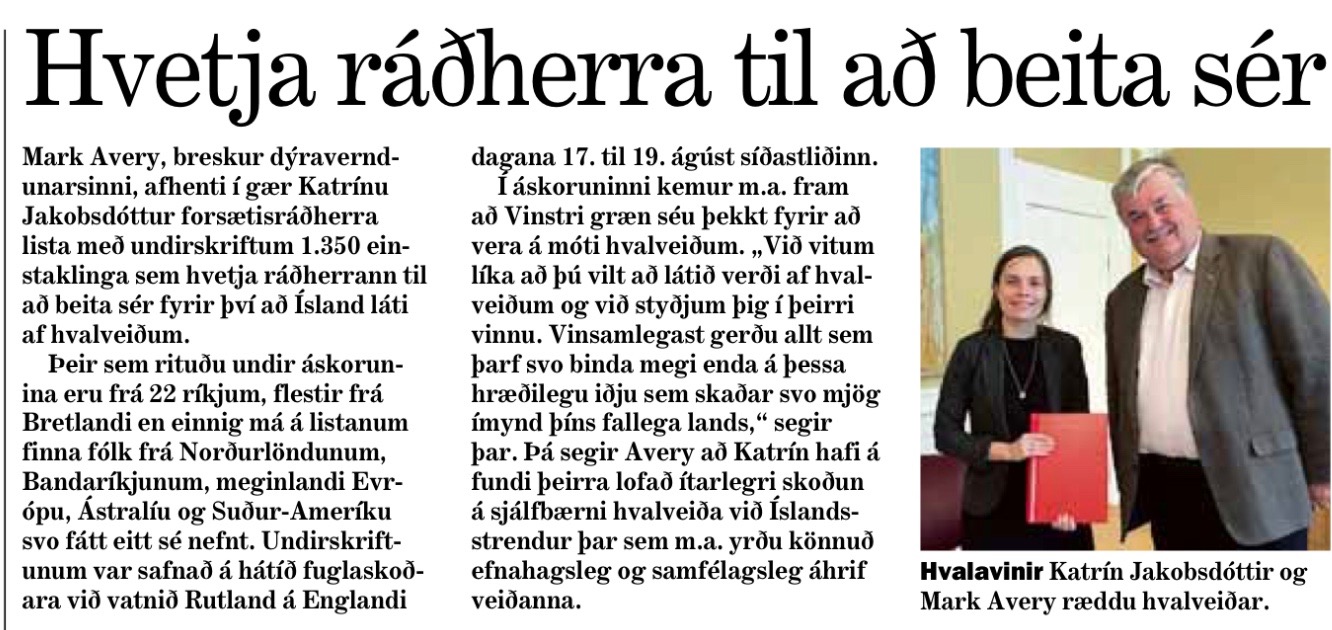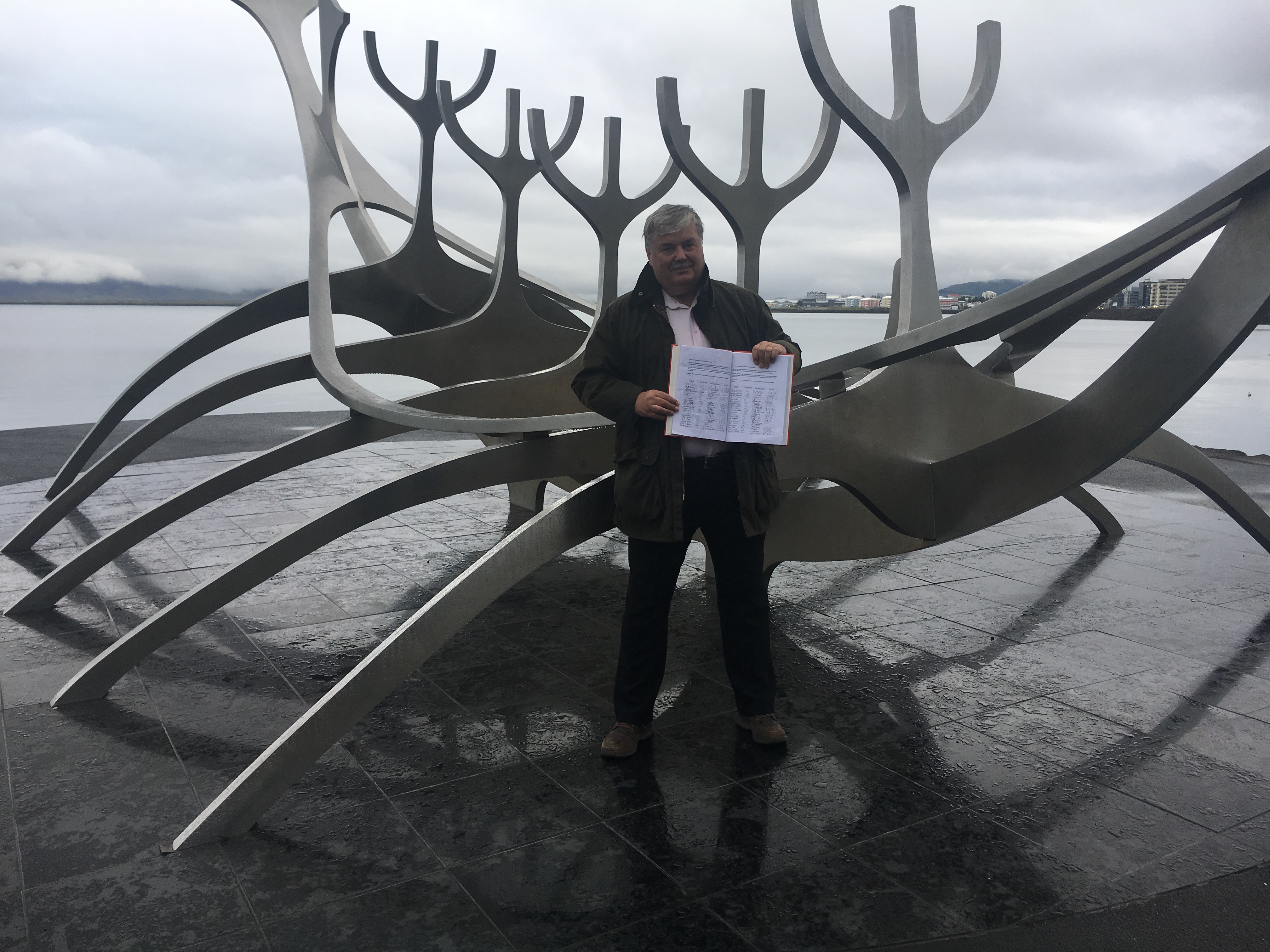
When I met the Prime Minister of Iceland in her office on Tuesday the most interesting thing that she said was that there would be a review of the sustainability of whaling in Iceland and that there would be no whaling until that review was completed.
This review has been talked about for quite a while and was expected. What came as a surprise to many in and out of Iceland was the statement that there would be no whaling until that review is completed and considered. And I double-checked with the Prime Minister that that was what she meant (there was no doubt – her English is very, very good) and that she was happy for me to repeat her words outside our meeting.
This is a critical time for whaling in Iceland for several reasons. First, the existing licences for Fin whaling expire in a few days time and unless and until they are renewed then that form of whaling cannot continue. Second, the International Whaling Commission is meeting in Brazil right now and news on whaling may emerge from there. Third, international condemnation of whaling continues to rise and the Bird Fair petition was one rather small aspect of that international feeling.
The terms of reference of the review into whaling will be important. It seems that the review will be framed in broad terms to include ecological, economic and social aspects of whaling. That has to be right. Those who are pro-whaling have always relied on the fact, and I believe it is a fact, that the level of Icelandic whaling, even of Fin Whales, is very unlikely to jeopardise the population (that tends to be called a stock by whalers). This is, of course, partly due to the fact that most countries have ceased whaling so it can’t really be seen as exemplary behaviour by Iceland (and I was able to make that point to the Prime Minister).
The economics of whaling will be much more difficult to investigate and I can imagine this aspect being tricky to think through, and contentious however it is done. Fin whaling is carried out by one individual and his whaling company in Iceland – the business of one very rich individual, Kristján Loftsson, is affecting how the international community thinks of Iceland as a nation!
Does the disapproval that many feel for whaling reduce the tourist industry in Iceland? How would you measure that? An incredibly simplistic response that I have heard several times over the last few days in Iceland, is that tourism has increased whilst whaling has continued so there cannot be a conflict – that is logically false and a proper investigation of the economics would have to look much deeper into this matter. And that is where the Bird Fair petition came in very handy. Wildlife tourists, and UK tourists to Iceland, are just the types of tourists that Iceland wants to encourage. We spend quite a lot of money, we visit Iceland through the year not just in the peak summer months, and we travel around the country spending our cash in remote rural areas not just in the delightful but expensive capital of Reykjavik. I was able to make the point to the Prime Minister that although many Bird Fair attendees had visited Iceland, and many would like to go, there were many who would choose to spend their wildlife tourism pounds elsewhere as long as Iceland continues whaling. How would you measure that loss in economic terms, and in social terms to widespread communities across Iceland?
I am not sure how the animal welfare aspects of whaling might fit in to the upcoming review – but I do think they should. Icelanders tend to talk about whales as if they were fish but they are mammals. If the lamb which I enjoyed in Iceland had been killed with an explosive harpoon and the sheep had taken many minutes to die, as whales often do, then there would be uproar. The quickest way to end whaling in Iceland would be to require observers on all whaling boats (paid for by the whalers) and publication of video footage of whales being killed. This could be incorporated in the social analysis of whaling. Icelandic public opinion is gradually moving against whaling (the most recent figures suggest the public is split fairly evenly, 50:50, on the subject) but images of Fin Whale foetuses being dragged across docksides have pushed opinion further, and the more that people see what whaling means, the more the average Icelander in the street will want to see whaling end.
A last point on this important review – it should be open and invite contributions from experts and the public across the world and throughout Iceland if it is to be credible. I hope that is the approach taken by the Icelandic government.
I will come back to Iceland as a country, and whaling as an issue, over the next few days but one last word about the Icelandic Prime Minister, Katrín Jacobsdottír. It was very good of her to meet a foreigner in her country and to give me 15 minutes to explain why wildlife-lovers from the UK find this an important issue. I’ve met a lot of politicians over the years (including a few PMs) and Iceland’s PM struck me as a well-informed, bright and engaged person on this issue. There is hope.

Well done, Mark.
Kevin Shaw
Heatherlea
Well laid out Mark.
As you say “the man in the street ” in Iceland is upset by the whaling.
Your comments about people visiting Iceland all year round reminded me, it is popular place a to go to see the northern lights.
How about amending your post as a letter to the BBC sky at night magazine saying birders have done their bit and asking readers to sign an online petition for astronomers.
The mag came to my attention when they cold called me re my holiday lodges in the dark sky area of Suffolk near Minsmere. Saying “In collaberation with the RSPB” etc Whether that is a real collaboration or not but maybe they would help. Maybe it was just a marketing phrase as the mag is produced by the same publishers as Natures Home where I advertise. Immediate Media Company Bristol Ltd
Thank very much Mark for the feed back, background information and all the effort you have gone to, let us all hope that the situation will change very soon.